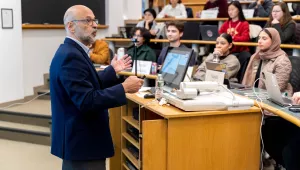Today, three of ten people on the planet rely on others to grow their food and 900 million remain chronically food insecure. By 2050 the global demand for agricultural production is expected to double. Half of the global population will live in cities and will need to be fed through market channels. Meeting these demands will require significant increases in agricultural productivity. Modern, science-driven farming including genetically modified crops represents the best chance of generating the increases in agricultural productivity necessary to feed our future. This paper's overall conclusion is that genetically modified crops can and should play a critical role in agricultural productivity. It is offers a roadmap for those interested in objectively evaluating both the risk and benefits of biotechnology in agriculture.
Juma, Calestous, Josh Drake and L. Val Giddings. “Feeding the Next Generation: Science, Business, and Public Policy.” Belfer Center for Science and International Affairs, Harvard Kennedy School, December 2011




